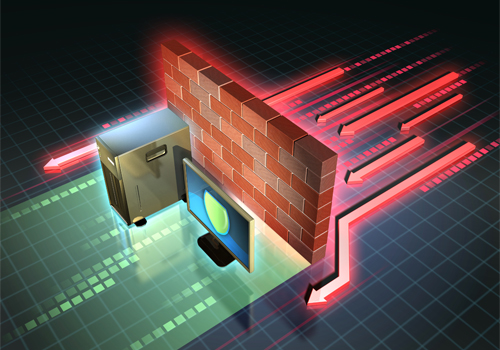What Does A Hardware Firewall Do?
One of the most important network security tools your small business can deploy is a network firewall. By serving as a barrier between your network and the outside world, firewalls protect you from cyber attacks and limit your exposure to risks and keep your sensitive data safe.
Today, many operating systems include, or may be upgraded with a software level firewall which provides some level of protection. However, a hardware firewall provides improved security over their software-based peers and generally better performance. This article will focus on how firewalls of all types work and highlight the advantages of hardware firewalls, such as their uniform protection across your entire network of computers, superior performance, and more robust intrusion prevention.

What Exactly Does a Hardware Firewall Do?
A hardware firewall is a physical device that sits between your router and the world wide web. The firewall monitors network traffic, both inbound and outbound, blocking suspicious activity and filtering harmful traffic. In effect, firewalls play a similar role as antivirus software, except instead of monitoring the activity on your computer they instead watch data packets on your network.
Hardware Firewalls vs. Software Firewalls
Hardware and software firewalls generally offer the same suite of features, but differ in some important ways. The chief differences between these types of firewalls are their scale of protection, ease of configuration, processing demands, latency, and sales-model.

Entire Network Protection
As a standalone physical device sitting upstream of your router, a single hardware firewall is able to protect your entire network. Software firewalls on the other hand are implemented on a per-device basis. This means that by relying on software firewalls your network protection may vary from device to device.
This may not seem to be much of a drawback, but in an era where more and more devices are connected to your Wi-Fi the reality is any given network presents numerous vulnerabilities which hackers can exploit. Internet of Things (IoT) devices like printers, smart thermostats, or even networked security cameras all are possible points of security failure, and generally don’t offer robust internal security and are infrequently updated.
Even without IoT devices as a risk factor, software firewalls are often poorly suited for networks with multiple operating systems.
If you are running a server on Linux while your terminals are using Windows then there is a high likelihood that you will need to pay for two separate firewall software plans. A hardware firewall can protect a diverse ecosystem of internet connected devices.
Ease of Configuration
A happy side effect of your entire network being protected by a single hardware firewall, is that it is easy to make system wide changes. Any changes to your entire network’s level of security only requires making a change on the hardware firewall itself.
Software firewalls operate as multiple, discrete units, and so changing your network’s security will require making these changes to each and every computer. This can quickly result in considerable workload for your tech team, and if updates are ever rolled back there is a chance that one or more of your devices will be running on older, less secure firewall settings.
Offload Processing Demand
Setting aside the matter of unprotected network devices, hardware firewalls offer another significant advantage: processing performance. In a physical firewall, all of the processing power needed to provide the protection happens within the firewall device itself.
A software firewall, on the other hand, will need to always be running in the background of your computers and servers, sapping RAM and processing capability. A way around this is to purchase hardware which has enough performance overhead to accommodate the extra processing requirements, but this will ultimately add to each unit’s cost and power consumption.
Decreased Network Latency
Network latency, or the response time between your computer and the internet, is lower when traffic is routed through a hardware firewall. Since hardware firewalls are optimized for analyzing web traffic, they outperform firewall software while delivering the same or greater levels of protection.
Single Purchase Vs. Subscription Model
One difference between hardware and software firewalls that is not clearly an advantage or disadvantage is how each is purchased. Hardware firewalls are typically purchased like any other piece of hardware: a single purchase and then a long period of cost-free ownership. Software firewalls, however, generally operate on the software as a service (SaaS) model, where businesses purchase licenses to use the software and then pay a monthly fee.
In the long run, hardware firewalls are generally cheaper, but if your business needs change radically you may need to upgrade your firewall to meet your new needs. A software based firewall can be upgraded by changing to a higher tier offered by the service provider, or perhaps changing to a higher-end company.
Microsoft Windows computers come with a very basic and free software firewall built-in, but for small and medium sized businesses it is advisable to upgrade to a more robust and configurable security solution.
How does a firewall protect my business?
Firewalls protect your business in a few ways. First, firewalls make it difficult for hackers to be able to probe the devices on your network for vulnerabilities. This is important because these vulnerabilities can be used to install malicious software (malware), including ransomwares which encrypt your company data and extort payment for the data’s release.
Beyond protecting your company from external attacks, firewalls also offer protection against internal threats. Many cyberattacks employ social engineering tactics, convincing email recipients to click on a link or open an email attachment. While training has been shown to reduce the efficacy of these attacks, some links inevitably get clicked and some attachments get opened. Once this happens the enclosed malware springs into action, trying to burrow into your system and communicate with its remote servers.

This is where a firewall steps in – detecting and blocking these nefarious signals before they have time to compromise your data. The malware itself may still be present and needs to be removed, but with no way of phoning home the attacks can be thwarted without compromising your data.
How does a Hardware Firewall protect my network?
In the past firewalls worked by simply blocking ports which were known to be used maliciously and by applying a set of packet filtering rules to all inbound and outbound data. However, next-generation firewalls (NGFWs) provide a complete suite of security features that enhance network protection.

Traffic Control
Traffic control is historically the primary role of a firewall, and while their functionality has morphed over the years, this is still one of the most important cybersecurity features that they provide.
In its simplest form, traffic control means that firewalls prevent unfriendly network traffic. This process works both upstream and downstream, preventing malware that has already made it onto your system from signaling out, as well as preventing hackers from scanning your network for potential weaknesses which they can exploit.
Many firewalls employ IP address blacklists, preventing known botnets or untrustworthy internet addresses from communicating with your network. This prevents both external intrusions, as well as preventing internal users from accidentally connecting to one of these compromised addresses.
Firewalls employ pattern recognition and machine learning algorithms which scan inbound and outbound traffic for malicious intent. When detected, these packets are walled off, preventing their information payload from reaching its intended target. Firewall security solutions include data logging, allowing businesses to detect when the firewall has blocked unwanted traffic.
Port Forwarding
Port forwarding, sometimes called port mapping, allows small businesses to configure a firewall in such a way to allow external devices access to the protected network. Without port forwarding a firewall would make remote access to server resources impossible, but when properly configured a firewall can provide both protection and access to authorized users.
VPN
If your business is not already using a VPN, it’s important to consider implementing this valuable security resource and a hardware firewall is a great way to go about doing it on a company wide level.
VPNs allow for enhanced security when accessing remote servers, protecting your connection from prying eyes. With more people than ever working from home, allowing your staff to access company resources without compromising your network integrity is more important than ever.
The added privacy goes further, preventing your internet service provider from being able to track your network activity. While you may not be terribly concerned about your network provider knowing about your usage since the worst they’ll likely do is use it for customized ad content, you should be aware that ISP server breaches are not unknown.
Increasingly, cybercriminals have realized that by intercepting traffic at a service provider level they can obtain detailed information about a wide range of businesses. The fewer people who are logging your business’s information, the less likely a breach will impact your operations.
While many software based VPNs are available, the advantages of using a hardware firewall which includes a VPN overlaps considerably with its advantages over software firewalls: it is easier to maintain a single standard for your entire network, processing is offloaded from individual devices, and network latency is reduced.
Gateway Antivirus
It has always been necessary to pair firewall solutions with antivirus software, but increasingly the distinction between these two layers of threat protection is blurring. NGFWs pair traditional firewall features with their own gateway level antivirus technology
Rather than simply stop all suspect traffic, these more advanced firewalls can communicate with cloud-based servers and seek verification. If the traffic is deemed safe it will be allowed to pass, otherwise it will be used to further hone the detection algorithms and limit the spread of zero-day exploits.
Harden Your Network With a Hardware Firewall
Protecting your business’s network from cyber attacks requires a multi-faceted approach. No single solution has yet proven to be the silver bullet against hackers, but hardware firewalls are an important part of staying safe online.
Businesses should pair their firewall with staying current on software and firmware updates, training their staff on internet hygiene, and using antivirus software. Bristeeri Technologies offers managed IT services which allow small businesses to operate safely online without needing to employ an in-house tech support team.
